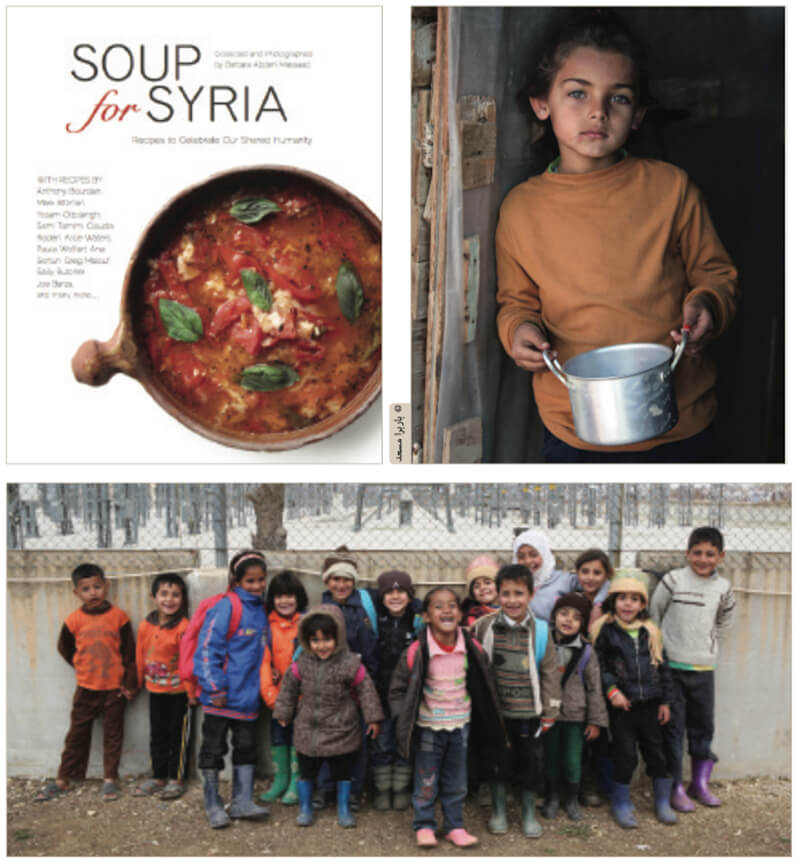The book is full of them: very colorful clichés of soup bowls and faces staring right across the glossy pages. But the eyes are not accusatory: children’s eyes smile, and those of the women speak to you. Barbara finds that «the eyes of people break the barriers of hatred.»
Details like nationality and religion, what part of Syria you come from and which side you take in the dragging war become irrelevant.
You see past the ragged condition of the campsite, through faces coarsened by recent experiences and emotions, and dire current living conditions: just people... humans. Their gaze, a dominant feature of the portraits, speaks of a rapport with the photographer, warms the pages, and the heart.
The book is an image of Barbara Massaad the person in hard-cover. Showcasing her two passions food and photography, it also reflects her generous humanist nature, and talent for reaching out to others with ease -and bonding.
Generosity is no stranger to the food culture
Like any good deed should, the project went smooth. The choice of soup specifically is symbolic: it represents the ultimate dish of comfort, warmth, and resilience that is cooked for many and shared. So friends and fellow cooks were invited to send in their soup recipes to help furbish a cookbook as well as sustain weekly culinary visits to the refugees’ camps.
While discussing her food relief efforts at a dinner party in London, Barbara showed a dummy of the book to Michel Moushabeck, who had previously published one of her cookbooks (Man’oushe, Inside the Street Corner Lebanese Bakery). He immediately sympathized: of Palestinian descent, his family had also fled his homeland to Lebanon then to the States because of the respective wars there. Soup for Syria started taking shape.
To optimize the project, both Interlink Publishing and Barbara contacted famous chefs worldwide from their respective networks, and more soup recipes poured in. Cooks and non-cook foodies shared the goodness of their culinary and gustative suggestions.
Out of hundreds of recipes collected, only 80 made it to the 208-page book. «The criteria were ease and convenience,» says Massaad. During the selection phase, she hosted a team of ten people in her house, and together they took to preparing and proofing the brews, «the most fun part of the whole experience.»
Among the contributors are prestigious names on the scene: famous food writers, critics, and activists (Mark Bittman, Anthony Bourdain, Sally Butcher, Greg Malouf, and Paula Wolfert), TV show personalities, famous restaurateurs and food bloggers, and a few food amateurs like the book’s graphic designer Pascale Hares.
On social media, contributors would tweet about their input, the cause it is helping promote and fund, and encourage sharing photos and accounts of tested recipes.
Sales of the book were promising even before the official book launch, and the publisher expects, according to Massaad, some 250 000 copies of it to be sold worldwide. The book launch fundraising event in Beirut featured several activities in addition to the signing: a photo exhibition, cookie sale and soup sampling in the presence of several contributors. Volunteers mobilized to donate the venue, the ingredients of the food sampling stations, and the cost of blowing-up posters and the photos exhibited. Other events and appearances are due for Soup for Syria in the coming couple of months: a book signing in Holland, another in Seoul for Asio Gusto, and a panel seat on the Table for Peace.
But those are not the only activities related to the book. The website of Soup for Syria (http://www.soupforsyria.com/) also encourages involvement through relevant and timely events like soups parties, small book-sale initiatives and suggestions, and features at other local events.
But most of all, it promotes buying the cookbooks directly through it to guarantee that 100 percent of the revenue will go to the United Nations refugee agency, UNHCR, to fund food relief efforts mainly, but also some medical cases that are not covered by the agency.
